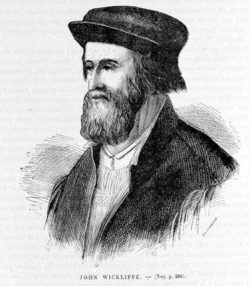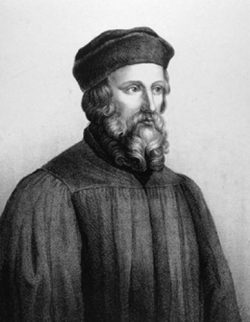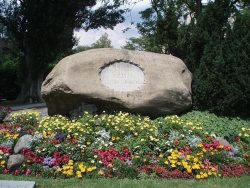Jerome of Prague (about 1379-1416)
He defended the ideas of John Wycliff, was a philosopher and pre-Reformer, a follower and friend of Jan Hus (1369-1415). Like him he was condemned by the council of Constance and was burnt alive for heresy.
Training and travels
Jerome was born in a wealthy family somewhere between 1365 and 1379. In 1398, once he had passed his bachelor diploma of Arts at Charles faculty in Prague, he travelled in Europe before returning to Prague. In those days the ideas of the pre-Reformer John Wycliff (about 1328-1384) were widespread in Bohemia but also throughout central Europe. They can be summarized in three principles:
- ecclesiastical hierarchy, i.e. the true Church is the invisible Church of Christians in a state of grace,
- the Bible is the highest authority,
- indulgences are useless: God alone forgives.
In 1402, Jerome left for England, and in Oxford he copied works of the pre-Reformer, author of a theological treatise in which he claimed the Bible to be the highest authority and contested indulgences. Jerome translated into Czech part of Wycliff’s works.
Upon leaving England, Jerome went to Jerusalem and then Paris, where he was awarded his Master degree at the Arts faculty and then taught there ; then he went to Cologne and Heidelberg where he was awarded again a Master’s degree in both cities.
Wherever he stayed Jerome aroused enmities after arguments over his defense of philosophical realism, his opposition to nominalism which claimed concepts to be mere human constructions. His ideas led to him being forbidden to teach.
In 1407, he went back to Prague where his three Master degrees were recognised. In 1410 he gave a lecture on Wycliff’s philosophical, but not theological, ideas. A papal bull condemned Wycliff’s ideas and Jerome was accused of defending them. He was imprisoned in Vienna but escaped. Back in Prague, Jerome made friends with Jan Hus whom he defended. He pleaded for mass in Czech. In 1413 Jerome travelled to Poland and Lithuania but had to retract over part of his writings on Wycliff.
Condemned by the council of Constance
During the period of three popes, the future Romans and German Emperor Sigismond I, intervened to put an end to the Great Western Schism (1378-1417). He imposed on Pope John XXIII, later to be considered an anti-pope, a meeting of the ecumenical council of Constance (1414-1418).
It also meant a posthumous inquisitorial trial for heresy of Wycliff and his living followers. The council used the trial as a claim for its own legitimacy – above that of the pope who acted on his own- and for deposing pope John XXIII who had fled away from the council, and for electing a new pope, Martin V.
In 1414, when Jan Hus left for Constance with the Emperor’s safe-conduct, Jerome promised to help him if need be. When Jerome reached Constance, without a safe-conduct, his friends convinced him to return to Bohemia as he could do nothing for his friend, and was also threatened himself. But he was arrested on his way back and imprisoned, and fell severely ill. Jerome was very weak and dissociated himself from Wycliff – whose writings were deemed by the council to be burnt and his bones unearthed and scattered- and also from Jan Hus who was burnt alive. Nevertheless Jerome was not released.
In 1416 during his trial, Jerome renounced his recantation. With some difficulty he obtained the right to plead his own case, but was sentenced as a relapsed heretic, turned over to the secular power to be burnt alive. He died singing and his last words were ‘this burning soul I offer to You, Christ’.
He was considered a hero of the faith by the Hussites. As a defender of the ideas of those in favour of reforming the Church, he ranked among pre-Reformers.
A memorial was erected in Constance where Jerome of Prague’s stake had stood. It consists of a large stone engraved with his name.
Bibliography
- Sites
- Documents
Associated tours
-
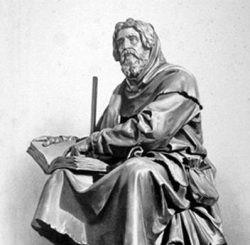
Forerunners of the Reformation
Long before Luther and Calvin others worked towards a reformation of the Catholic Church. Throughout the Middle-Ages there were constant movements calling for reformation, some were absorbed by the Catholic...
Associated notes
-
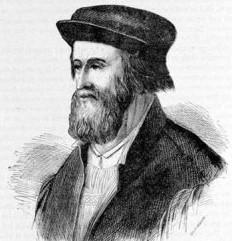
John Wyclif (c. 1328-1384) and the Lollards
Wyclif, a distant precursor of the Reformation, challenged the Church’s authority and hierarchy. His followers, the Lollards, instigated a peasant revolt. They denounced the established Church. -
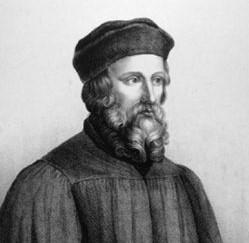
Jan Hus (1369-1415) and the Hussite wars (1419-1436)
Hus was a Czech priest, who, a century before Luther, called for a reform of the Chuch and was burnt at the stake. His death set off a religious, political...


